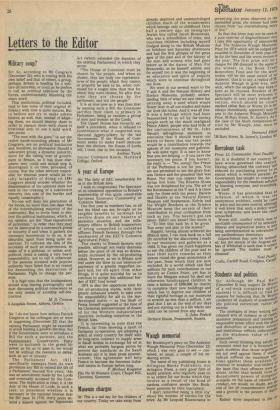Museum charges
Sir: This is a sad day for the children of our country. Today we take away from
already deprived and underprivileged children much of the wonderment which belongs only to childhood. Over half a century ago, an immigrant Jewish boy called Jacob Bronowski, who was a schoolfellow of mine, and countless children including myself trudged along to the British Museum on holidays and Saturday afternoons and had the first glimpse of the great ages of the past and of the history of the men and women who had gone before us in the Ascent of Man. For Bronowski, as he himself admits, and for myself too it was the beginning of an education and spirit of enlquiry which were to continue throughout our lives.
We went in our several ways to the V and A and the Natural History and Science Museums, probably understanding little of what we saw there but carrying away a seed which would flower later in all our studies and make our lives the richer. And it was all free. It was a heritage which had been bequeathed to us all by far-seeing people such as the much maligned Prince Albert, people who had little of the unctuousness of Mr St. John Stevas's self-righteous statement on television that it should warm our hearts to know that our ten pence would be a contribution towards the' upkeep of our museums and galleries. He was quite right. It is nice to know that you are helping — if you have the necessary ten pence. If you haven't, the reply is — "No, sonny! The Frieze of the Parthenon is not for you. You are not permitted to see the glory that was Greece and the grandeur that was Rome. Nor may you inspect the Assyrian lion hunt. The Rosetta Stone was not deciphered for you. The art of the Renaissance at the V and A is there only for those with ten pence. Darwin and Huxley at the Natural History Museum and Stephenson, Kelvin and the Wright Brothers at the Science Museum keep the secrets of their contribution to your civilisation from such as you. You haven't got ten pence. Didn't you know? Our motto is — 'To him that hath let it be given.' Run away and play in the streets."
Happily, having almost achieved the Biblical span, I can look back on a full life enriched by the discoveries I made in our museums and galleries as a child. It has given me much happiness to see the children of the poor and to hear their naive remarks as they swarm round the great monuments of the past, from which they are now excluded. In a world which can find millions for such contributions to our history as Centre Point, yet has to leave the Margate school for deaf and otherwise handicapped children to raise a balance of E200,000 by charity to complete their new buildings and which has to deprive our children of their rightful heritage in our museums to scratch up less than a million, I am glad that I am at the end of my days and not starting out in a life where any child can be turned from any door.
S. John Peskett Orchard House, Peasmarsh, Sussex.


































 Previous page
Previous page